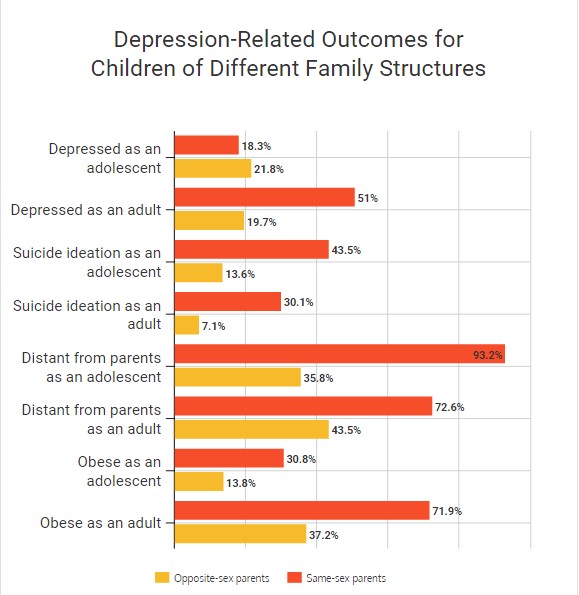Editor’s note: here’s another article on the following topic:
Are the kids all right? Ask them when they are adults
A new study finds half of adults raised in same-sex households depressed.
Here is Mark Regnerus writing at Public Discourse about another extremely important study that not nearly enough Americans will learn about. Why won’t they? Because conservatives continue to fail to adequately fight the information war:
A new study examines the risk of depression and other negative outcomes among adolescents and young adults raised by same-sex couples.
A new study released earlier this month in the journal Depression Research and Treatment contributes to mounting evidence against the “no differences” thesis about the children of same-sex households, mere months after media sources prematurely—and mistakenly—proclaimed the science settled.
One of the most compelling aspects of this new study is that it is longitudinal, evaluating the same people over a long period of time. Indeed, its data source—the National Longitudinal Study of Adolescent Health—is one of the most impressive, thorough, and expensive survey research efforts still ongoing. This study is not the first to make use of the “Add Health” data to test the “no differences” thesis. But it’s the first to come to different conclusions, for several reasons. One of those is its longitudinal aspect. Some problems only emerge over time.
Professor Paul Sullins, the study’s author, found that during adolescence the children of same-sex parents reported marginally less depression than the children of opposite-sex parents. But by the time the survey was in its fourth wave—when the kids had become young adults between the ages of 24 and 32—their experiences had reversed. Indeed, dramatically so: over half of the young-adult children of same-sex parents report ongoing depression, a surge of 33 percentage points (from 18 to 51 percent of the total). Meanwhile, depression among the young-adult children of opposite-sex parents had declined from 22 percent of them down to just under 20 percent.
Read more: Public Discourse
Image credit: www.publicdiscourse.com.

